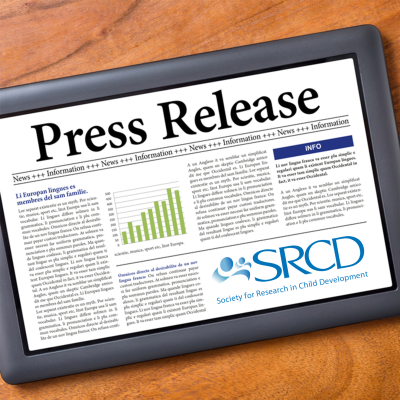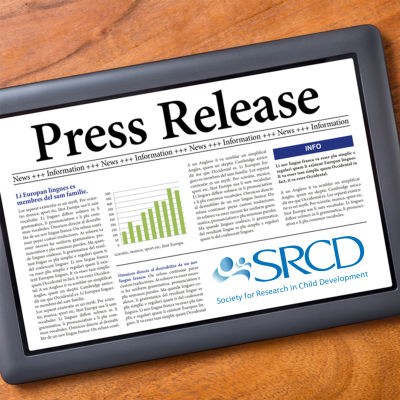Child Development Journal Q&A: Music Intervention Programs Can Enhance Parent and Baby Language Interactions
PRESS RELEASE / CHILD DEVELOPMENT: Embargoed for Release on September 28, 2023
Previous research shows that conversational turns (interactive conversations) between parents and children are important for a child’s long-term language development and academic achievement and that these conversations can be enhanced via parent-coaching language interventions. The neural networks responsible for language develop rapidly even before a child can talk, making these interactive conversations especially important during infancy.
Music is an engaging and social experience between parents and children that is often part of daily routines during infancy. Emerging literature also documents links between music experiences and child language outcomes. Researchers in the current study explored whether participation in Music Together®, a community-based music enrichment program, could foster these important language interactions between parents and young children. Eighty-nine parent-child pairs were randomly assigned to either the Music Together® (music) or play date (control) classes. Children were 9- to 15-months old at baseline, primarily white (86.7%) and female (52%). The sample also consisted of primarily highly educated (college graduate or higher: 71.1 %), mid-upper income (greater than $50,000: 81.5%, White families (mother’s race: 86.7%).
The findings show that Music Together® participants had a significantly greater increase in conversational turn measures and quality of parent verbalization post-intervention. Music enrichment programs may be a strategy to enhance parent-child language interactions during early childhood. The Society for Research in Child Development (SRCD) had the opportunity to chat with author Dr. Amy R. Smith from Children’s Mercy Kansas City in Kansas City, Missouri and University of Kansas Medical Center in Kansas City, Kansas, United States of America about this important research and its implications.
SRCD: What contributed to your interest in pursuing this particular research?
Dr. Smith: As a board-certified music therapist, I am particularly interested in how music benefits early development. I have seen firsthand how music interventions can enhance early language development and this research was an exciting opportunity to examine the impact of a commercially available music class on conversational turns, a critical aspect of the language environment.
SRCD: Describe your research questions.
Dr. Smith: The primary aim of this research was to explore if participation in a Music Together® program could foster conversational turns and attuned language interactions. To do this we examined the differences in conversational turns and the quality of parent verbalizations between participants in the Music Together® program and those in a playdate control group.
SRCD: Please summarize your findings.
Dr. Smith: We found that participants in the Music Together® program had a significantly greater increase in their conversational turns and the duration of their conversational episodes compared with those in the control group. The largest difference between groups occurred during the first 6 months of the year long program. We also observed a significant improvement in parent verbal quality during the latter half of the program. The significant results remained even after controlling for attendance.
SRCD: What are some implications of your research?
Dr. Smith: Our results demonstrate that community-based music programs could serve as a promising population level intervention during infancy which is a period of rapid language development. Children growing up in households of low socioeconomic status (SES) are disproportionately at risk for language difficulty in part from experiencing less conversational turns. Although the participants of this study were primarily middle to upper income families, offering community-based music programs in low-SES communities may lead to improvements in the language environment and overall language development in at-risk children.
SRCD: What are any limitations in your research?
Dr. Smith: Since this study was a secondary analysis and not originally designed to evaluate language, we did not collect any child language outcomes, so it is unknown if attending the Music Together® program had any impact on language development. All participants in this study were English speaking so our results cannot be generalized to individuals who speak other languages. The sample also consisted of primarily high educated, mid-upper income, White families. Future work should include a broader population.
We measured conversational turns from short lab-based play interactions and not using day-long recordings of the infant’s natural home environment. It is not known how the two measures differ.
SRCD: Do you have recommendations on future work in this area?
Dr. Smith: Participation in Music Together® improved conversational turns in our sample of upper-middle class families with no known risk factors for language development. Future research is needed to include participants with identified social and environmental risks for language difficulty. Further research is also warranted to explore the contribution of specific music elements such as rhythm, pitch, melody etc. to develop a more targeted music intervention for improving conversational turns.
SRCD: If you could offer one quote or takeaway about the research, what might that be?
Dr. Smith: Parent-child music interaction is well known for supporting early development but to our knowledge, this is the first study to investigate the impact of a community-based music program on key features of a high-quality language environment.
###
This work was funded by the National Institutes of Health’s Eunice Kennedy Shriver National Institute of Child Health and Human Development.
Summarized from Child Development, “The impact of a community-based music program during infancy on the quality of parent-child language interactions” by Smith, A.R. (Children’s Mercy Kansas City and The University of Kansas Medical Center), Salley, B. (University of Kansas Medical Center and Children’s Mercy Kansas City), Hanson-Abromeit, D. (University of Kansas), Paluch, R.A. (University of Buffalo, the State University of New York), Engel, H. (Children’s Mercy Kansas City), Piazza, J. (University of Buffalo, the State University of New York), Kong, K.L. (Children’s Mercy Kansas City and University of Missouri Kansas City and University of Kansas Medical Center). Copyright 2023 The Society for Research in Child Development, Inc. All rights reserved.


